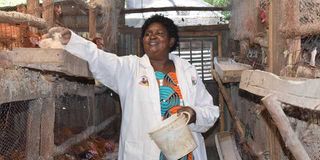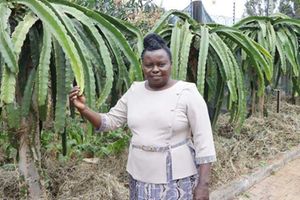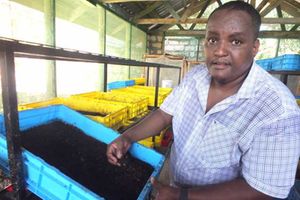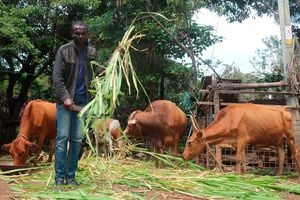
Damaris Awino ‘Nyasuba’ feeds her chickens in Nyakach, Kisumu County. She has more than 900 birds.
We find Damaris Awino and two helpers weeding vegetables on her two-acre farm in Urudi, Kisumu County.
Awino is popularly known as Nyasuba in Nyakach. She is also a poultry farmer with about 900 chickens of different breeds.
There are three structures in the poultry section of the farm, with the layers separated from the growers.
Nyasuba has about 600 layers and 120 cockerels, with the rest being growers.
"I have a mix of Sasso, Kenchic and Kukuchick birds. I mainly produce fertilised eggs and chicken meat for sale," she says.
Nyasuba's poultry business is eight years old. She started with three Kukuchick birds donated by the NGO World Vision in 2016.
"I was a political activist before I started farming. When World Vision started training locals in poultry farming, my community suggested that I join," she says.
After acquiring the necessary skills, World Vision took the trainees to Yatta in Machakos County for benchmarking. On her return, she decided to farm full-time and steer clear of politics.
"Kenyans are sceptical. I know it is very difficult to convince them that I started with just three birds. I've heard people make fun of motivational speakers," she says.
"The beginning was humble. The three birds laid fertilised eggs, which I took to a hatchery in Nyando.
In time, the flock multiplied many times over. Proceeds from the sale of the chickens were used to buy feed. Nyasuba then built a modern chicken coop.
After some research, Nyasuba realised that she could make a tidy sum by trading in fertilised eggs. She was then introduced to a buyer in Mbita who ran a hatchery.
"After getting the market for fertilised eggs, I started buying layer chicks," she says.
F1 Sasso birds are generally larger than other breeds.
Their eggs are also larger and produce quality chicks.
When Nyasuba gets the chicks from the hatchery, she puts them in a brooder for two months before moving them to the main coop.
Nyasuba has a vaccination schedule for the birds. The chickens are vaccinated against Gumboro on day 10 and New Castle on day 20 and 30. They are vaccinated against fowl pox at eight weeks. They are dewormed every three months.
She has identified two companies that deliver feed to her doorstep. The birds consume ten 70kg bags of feed every week.
Nyasuba gets a bag of layer mash for Sh3,200, while grower mash costs Sh3,300.
"I only give them commercial feed and plenty of water. When I started adding green vegetables to their feed, egg production dropped. I stopped doing that," she says.
"Whenever egg production drops, we take samples of the feed to a laboratory in Kisii. If the lab results indicate a problem with the feed, the company responsible compensates me and provides an alternative.
The hens start laying eggs after five months of growth. Initially, she received five boxes of fertilised eggs a week, but the number increased over time.
As the demand for fertilised eggs grew in Kisumu and surrounding counties, Nyasuba also increased the number of layers.
"This is a continuous business. I keep a layer for a year before I sell it. Records are important in poultry farming. I have already placed an order for 500 chicks to keep the business going," says Nyasuba.
The farmer gets 48 boxes of fertilised eggs a week from the birds, which he delivers to the hatchery every Tuesday and Friday.
When the Seeds of Gold arrive at the farm, Nyasuba has 24 boxes of fertilised eggs to sell. A box costs Sh900.
The eggs are packed into boxes and taken to the Pap Onditi matatu terminus on their way to Mbita.
Nyasuba used to give the eggs to local shopkeepers to sell on her behalf, but she lost a lot of money because the shopkeepers always played hide-and-seek when she demanded her dues.
"I have learnt from experience that small changes in the environment, feeding patterns and health of the birds affect productivity," she says.
Getting feed can be a challenge on some occasions. "When there is a shortage of feed, cannibalism sets in," says Nyasuba.
She advises those thinking of getting into the poutry business to do market research first.
"If there is no ready market, you are likely to make huge losses. If the eggs are not taken to a hatchery 10 days after they are laid, they are unlikely to produce chicks," she says.
Steve Sande, a poultry expert, says that the business of producing fertilised eggs is a delicate one and requires keen, patient and dedicated skill.
"Inbreeding can result in poor quality chicks," says Sande.
"The farmer should separate small, cracked and dirty eggs from the others. Note that not all eggs laid need to be taken to the hatchery.










